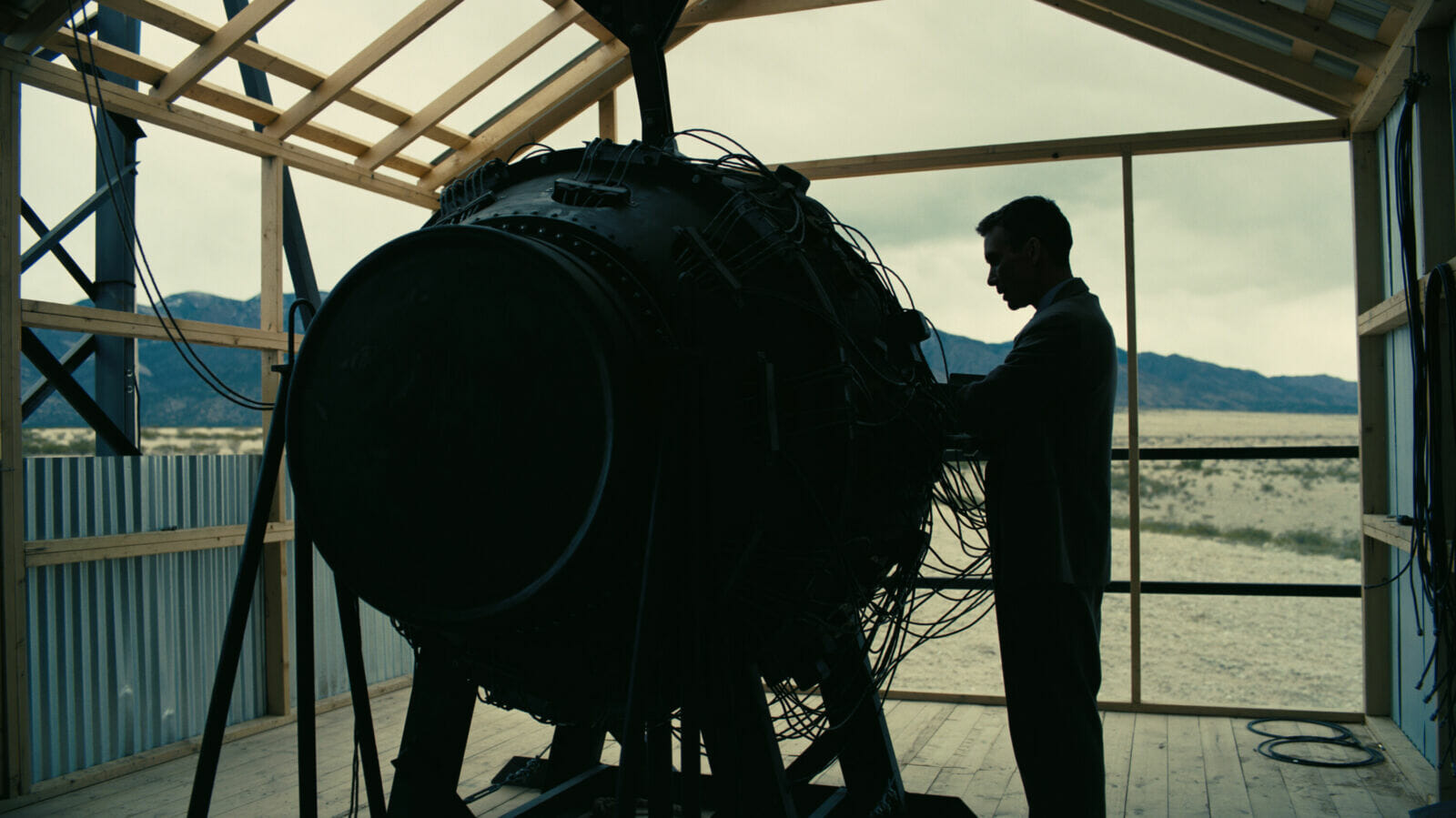This review was written during the 2023 WGA and SAG-AFTRA strikes. Without the labor of the writers and actors on strike, the film covered here wouldn’t exist. The cast of Oppenheimer walked out of its world premiere to join the strikes, so if you feel like supporting them, consider donating to the Entertainment Community Fund, which is assisting the workers affected—and, if you’re interested, go see Oppenheimer, but don’t say I didn’t warn you.
READ ALSO: Read all of Ryan Bordow’s movie reviews here
Christopher Nolan’s latest, adapted from the acclaimed biography American Prometheus, approaches the subject with his proven distaste for chronological time. The life of J. Robert Oppenheimer, “father of the atomic bomb,” is rent apart and rearranged into a web of structural gambits: if time is a sheet of paper, à la Interstellar, it’s been folded up thick to condense ideas from across the man’s career. His dalliances with communism and years with the Manhattan Project are juxtaposed with hearings in the 1950s; shifts between color and black-and-white denote changes in perspective through which the history is filtered. This thing is a behemoth, a three-hour analysis and recreation presented as epic tragedy—but it’s also deeply unsubtle, the kind of biopic where someone looks Oppie in the eye and says “You’re the American Prometheus.”
The pitfalls of Nolan’s dialogue are in full force here: mountains of exposition, underwritten women, characters speaking in cleverness contests, and his constant, palpable fear that the audience might miss what he’s getting at. That bluntness is welcome now and then—the film is resolute that we shouldn’t have dropped the A-bombs, clearing one of the lowest moral bars in history—but it’s mostly a road to repetition. “Is anyone ever going to tell the truth about what’s happening here?” Oppie asks, unaware that the cast of mouthpieces has laid out the truth in triplicate. Early on, before Oppenheimer starts building the bomb at Los Alamos, he muses, “When I was a kid, I thought if I could find a way to mix physics and New Mexico, my life would be perfect.” What tragic irony we’ve contrived here today. The man’s passion was the world’s downfall—do you need to hear it again?
It’s a shame the writing is so heavy-handed: when Nolan communicates without it, he does some of his very best work. In early scenes, as Oppie ponders the mysteries of theoretical physics, we get glimpses of the images inside his mind’s eye: particles dancing like lightning bugs in space, stars swallowed up in a silent, pitch-black vortex. These sequences, always brief, often quiet, emit a cosmological beauty—the hidden mechanics of nature conceived by the complex mind. When Nolan returns to Oppie’s thoughts after America bombs Japan, they’ve descended straight into hell: flashes of fire, visions of suffering, and a deafening rumble of overwhelming portent. In image, sound, and performance, Nolan captures the enormities of harnessing nature and mind for slaughter. It’s far more effective than practical effects trying to remake the A-bomb.
But between the moments of vision are hours of dry, over-dramatized dialogue, much of which is paced at a nonstop clip, like Nolan could only get oxygen from the breaths his actors couldn’t take. The scenes themselves have no room to breathe either: they always hurdle to the next thing, whether it’s a flash forward or back reemphasizing what you just saw (as with the final scene, which would be powerful if it weren’t redundant) or yet another “conversation” of expository spiels. The barreling forward maintains a certain mood—history racing (or looping back) to inevitable disaster because our best minds could house their progress nowhere but the war machine—but in the moment, the endless, deadening dialogue numbs the senses dull. It’s a curious blend of boredom and dread, never one without the other in tow.
The last act is the worst in that regard. The third hour pivots to courtroom drama for two protracted hearings, complete with boldfaced historical references, sub-Sorkin “please clap or gasp here” lines, and an easy, anti-Oppie villain who, in (partially) vindicating Oppenheimer by being clearly in the wrong, threatens to dress the film in hagiography. The one kernel of truth the antagonist strikes on is that Oppie should’ve had more moral scruples going into the Manhattan Project, which, in concert with Cillian Murphy’s convincingly conceited performance, speaks to how Oppie’s tunnel vision eschewed moral responsibility. But in the ocean of technical detail, the film says that more than it shows it: the human mechanisms by which Oppie steeled his heart play mostly outside the frame. Rather than dissect the man, the film covers the legend, the figure, an anthropomorphic conception of nuclear deterrence (staving off nukes with nukes, doing wrong for the “right” reasons, immorality in amorality’s clothing). Over the course of three long, dense hours, these ideas are both overexplained and under-ensouled.
Which is, once again, a shame; the film has so much else going for it. It’s handsomely shot, well-acted, formally audacious, and features a terrific score. But it’s less than the sum of its many moving parts. Rarely is a film this eventful and researched so profoundly boring and trite.
★★ (2/5)




